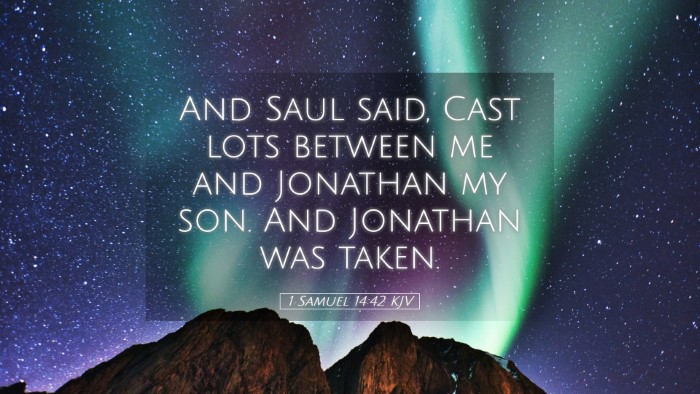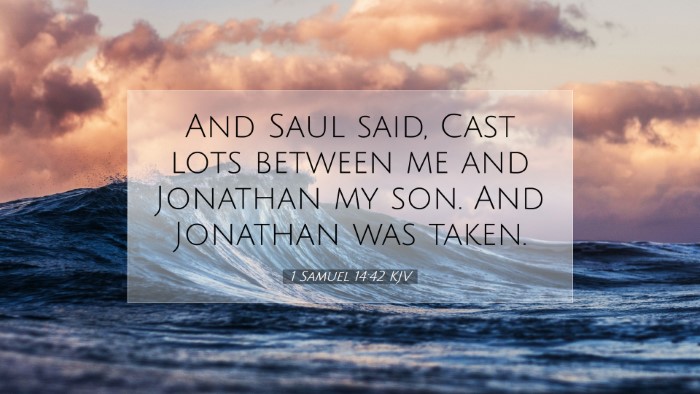Commentary on 1 Samuel 14:42
Verse Reference: 1 Samuel 14:42 - "And Saul said, 'Cast lots between me and Jonathan my son.' And Jonathan was taken." (ESV)
Introduction
The context of 1 Samuel 14 involves Saul's leadership amidst the conflict with the Philistines and the bravery of his son Jonathan. This verse highlights a pivotal moment where Saul seeks divine guidance through the casting of lots, revealing the tension in his leadership and the nature of divine will.
Analysis of the Text
1. The Context of the Decision:
This verse follows a battle in which Saul and his men faced significant difficulties, exacerbated by his earlier rash vow that led to exhaustion among his troops. Jonathan, acting independently, had achieved a remarkable victory, showcasing his faith and courage as he engaged the Philistines. However, Saul's reaction to Jonathan's actions reflects his struggle for control and the consequences of his leadership decisions.
2. The Act of Casting Lots:
The practice of casting lots was an ancient method used to discern God’s will. In this instance, Saul's reliance on this method may indicate his inability to receive personal guidance from God, which contrasts sharply with Jonathan, who had acted with faith. Matthew Henry notes that God’s silence in this situation may have been indicative of Saul's disobedience, thus limiting his effectiveness as king.
Theological Insights
1. The Sovereignty of God:
The casting of lots signifies the belief that God is sovereign over all decisions, including those seemingly random. Albert Barnes highlights that while the method may appear haphazard, the outcome rests fully in God's hands. This illustrates the concept that human actions are ultimately accountable to divine authority.
2. The Nature of Leadership:
Saul's decision to cast lots rather than rely on divine revelation may demonstrate his insecurity as a leader. Adam Clarke suggests that true leaders should be guided by God's pace and intentions rather than through superficial means. Saul’s approach reflects a shift from faith-driven leadership to one marked by confusion and uncertainty.
3. The Consequences of Sin:
Saul's reliance on casting lots after a series of questionable decisions points to the ramifications of sin in leadership. Henry points out that God had withdrawn His favor from Saul, which is evident in his lack of direct communication from God in critical moments. This serves as a sober reminder to leaders about the importance of maintaining integrity and obedience to God's will.
Character Reflections
1. Saul’s Leadership Style:
Saul's leadership, characterized by impulsivity and a lack of spiritual awareness, led him into a situation where he felt compelled to resort to casting lots. His inability to consult God directly reflects a deteriorated relationship with the divine, emphasizing the importance of spiritual counsel in leadership. Clarke posits that Saul's erratic behavior foreshadows the eventual consequences of his kingship.
2. Jonathan’s Faith:
In contrast, Jonathan’s earlier acts of bravery stemmed from his unwavering faith in God. Jonathan’s reliance on God rather than on signs demonstrates a deep spiritual maturity. This starkly juxtaposes Saul’s reactive measures of divination, highlighting the necessity of personal faith in leadership.
Practical Applications
1. Seeking Divine Guidance:
When faced with decisions, it is critical for leaders and believers to seek God’s guidance through prayer and reflection rather than relying on chance. This passage teaches us the importance of maintaining an active, personal relationship with God for wisdom in decision-making.
2. The Role of Faith in Leadership:
This narrative encourages current and aspiring leaders to cultivate a deep trust in God. Rather than allowing external pressures to dictate actions, one should act out of a foundation of faith. Jonathan's example serves as a model for how to respond to challenges with courage derived from trust in God.
Conclusion
1 Samuel 14:42 encapsulates the struggles of leadership and the importance of spiritual integrity. For Saul, the act of casting lots is emblematic of his fractured connection with God and the consequences of his prior disobedience. In contrast, Jonathan’s faith shines as a beacon of hope and a model for trusting God fully. The tensions illustrated in this passage challenge leaders to reflect on their motivations, the sources of their guidance, and ultimately, their relationships with God.
References
- Henry, Matthew. Matthew Henry's Commentary on the Whole Bible.
- Barnes, Albert. Barnes' Notes on the Bible.
- Clarke, Adam. Adam Clarke's Commentary.


